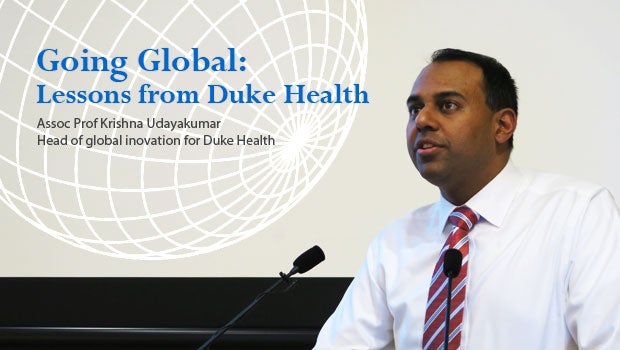HealthXchange will NEVER ask you to transfer money over a call. If in doubt, call the 24/7 ScamShield helpline at 1799, or visit the ScamShield website at www.scamshield.gov.sg.
Going global

If we are motivated to serve where there is need, then we need to understand where the need exists.
As developing nations in Asia and Africa form the bulk of population growth in the next several decades, the greatest burden of diseases also fall on them. Yet, the current size and distribution of the healthcare workforce in those countries are inadequate to meet their needs.
This situation is further complicated by communicable diseases such as SARS, Ebola and Zika that know no borders. Control and cures to these epidemics rely on cross-border collaboration. We have to start thinking globally as diseases and healthcare solutions do not always come from our own backyard.
An academic health system, such as Duke Health or SingHealth Duke-NUS AMC, has the resources to connect with partners around the world, improve the health of their population and exchange innovation and knowledge. The aim is to amplify the impact of the healthcare mission to where it is most needed.
Duke established the office of Duke Medicine Global eight years ago to bring expertise and capabilities from across Duke Health to do exactly this. Here’s what we have gathered from our journey:
1. Global missions needs to fit in with the vision of the organisation, and the leaders need to commit to stay on course. It’s a long journey.
2. Invest in key people, systems and infrastructure to support globalisation. Be clear of your funding model and the financial sustainability of the project.
3. Engage the best-in-class local partners. They are key in how successful you are within the local communities.
4. Focus! Be clear on where the projects fit, and the impact you are trying to achieve.
5. Learn from global best practices. Going global gives you the opportunity to innovate and engage with passionate collaborators all over the world. For example, we can learn from Narayana Health, a hospital based in Bangalore, India, which pioneered an open heart surgery which only costs US$2,000 with comparable outcomes to the US.
6. Plan for long term sustainability. Many projects have a long time horizon before they show their value. Have the stamina to deliver value consistently over the long term.
7. Key performance indicators are important. They show the value generated from the venture and let you understand how successful you have been.
All in all, we need a proactive, strategic and comprehensive approach that combines all the factors to build sustainable global initiatives to improve health.
It is absolutely necessary for an academic health system which has the capabilities to combine and integrate research, education and healthcare delivery to help achieve health equity worldwide.
There is much that we can contribute, and even more to learn beyond our own borders.
Assoc Prof Krishna Udayakumar gave a talk on "Being a global leader in health" on 31 August 2016 at SingHealth's Academic Hour.
Get the Health Buddy App
© 2025 SingHealth Group. All Rights Reserved.













 Get it on Google Play
Get it on Google Play